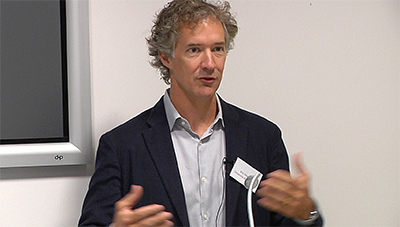Eric Oliver : Enchanted America: Magic, Metaphor and Conspiracy Theories in US Public Opinion
Duration: 41 mins 40 secs
Share this media item:
Embed this media item:
Embed this media item:
About this item

| Description: |
Suspect Science: Climate Change, Epidemics, and Questions of Conspiracy
17 - 19 September 2015 Convenors Dr Nayanika Mathur and Dr Alfred Moore, Research Fellows on the Conspiracy and Democracy project. Summary In recent years conspiracy theories have come to be seen as a threat to democracy. They have been variously linked to a crisis of trust in government, to the undermining of democratic deliberation, and a weakening the state's capacity to govern. Particular concern has focused on conspiratorial suspicion of science, in cases ranging from climate change to HIV-AIDS to vaccines and public health surveillance more generally. Where science, politics and power intersect we find rich ground for suspicion and mistrust of experts, and accusations of conspiracy. This raises a number of important questions. Why do people believe in conspiracy theories? How do people think about conspiracies? How are we to make sense of the relationship between mistrust of expertise and accusations of conspiracy? How have boundaries been drawn between authorized and unauthorized knowledge? How are anxieties about conspiracies related to more general problems of explanation and causal attribution in complex environments? In this conference we aim to situate these questions about 'suspect science' in broader conceptual, geographical and historical contexts. We will address them by drawing together scholars from a wide range of disciplines, including anthropology, public health, history, politics, sociology, psychology, and philosophy, and we will consider a wide range of empirical cases. Through this interdisciplinary approach we hope to stimulate critical reflection on the shifting problems of doubt, denial and dissent in the politics of knowledge. Keynote speakers: David Runciman, University of Cambridge Eric Oliver, University of Chicago Harriet Washington, University of Las Vegas, Nevada |
|---|
| Created: | 2015-09-28 09:52 |
|---|---|
| Collection: |
Conspiracy and Democracy
Conspiracy and Democracy |
| Publisher: | University of Cambridge |
| Copyright: | Glenn Jobson |
| Language: | eng (English) |
| Distribution: |
World
|
| Keywords: | CRASSH; Eric Oliver; Conspiracy and Democracy; |
| Explicit content: | No |
| Aspect Ratio: | 16:9 |
| Screencast: | No |
| Bumper: | UCS Default |
| Trailer: | UCS Default |
| Abstract: | Suspect Science: Climate Change, Epidemics, and Questions of Conspiracy
17 - 19 September 2015 Convenors Dr Nayanika Mathur and Dr Alfred Moore, Research Fellows on the Conspiracy and Democracy project. Summary In recent years conspiracy theories have come to be seen as a threat to democracy. They have been variously linked to a crisis of trust in government, to the undermining of democratic deliberation, and a weakening the state's capacity to govern. Particular concern has focused on conspiratorial suspicion of science, in cases ranging from climate change to HIV-AIDS to vaccines and public health surveillance more generally. Where science, politics and power intersect we find rich ground for suspicion and mistrust of experts, and accusations of conspiracy. This raises a number of important questions. Why do people believe in conspiracy theories? How do people think about conspiracies? How are we to make sense of the relationship between mistrust of expertise and accusations of conspiracy? How have boundaries been drawn between authorized and unauthorized knowledge? How are anxieties about conspiracies related to more general problems of explanation and causal attribution in complex environments? In this conference we aim to situate these questions about 'suspect science' in broader conceptual, geographical and historical contexts. We will address them by drawing together scholars from a wide range of disciplines, including anthropology, public health, history, politics, sociology, psychology, and philosophy, and we will consider a wide range of empirical cases. Through this interdisciplinary approach we hope to stimulate critical reflection on the shifting problems of doubt, denial and dissent in the politics of knowledge. Keynote speakers: David Runciman, University of Cambridge Eric Oliver, University of Chicago Harriet Washington, University of Las Vegas, Nevada |
|---|---|
Available Formats
| Format | Quality | Bitrate | Size | |||
|---|---|---|---|---|---|---|
| MPEG-4 Video | 1280x720 | 2.95 Mbits/sec | 924.78 MB | View | Download | |
| MPEG-4 Video | 640x360 | 1.9 Mbits/sec | 596.45 MB | View | Download | |
| WebM | 1280x720 | 2.5 Mbits/sec | 784.13 MB | View | Download | |
| WebM | 640x360 | 608.16 kbits/sec | 185.60 MB | View | Download | |
| iPod Video | 480x270 | 490.12 kbits/sec | 149.57 MB | View | Download | |
| MP3 | 44100 Hz | 249.8 kbits/sec | 76.29 MB | Listen | Download | |
| Auto * | (Allows browser to choose a format it supports) | |||||

